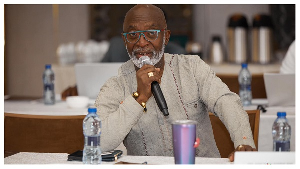Chief Executive Officer-Ghana Investment Promotion Centre (GIPC), Yofi Grant, has urged African nations to monetise their natural resources to generate the revenue required for creating transgenerational transformative wealth.
With Africa recorded as being home to some 30 percent of the world’s mineral reserves, 40 percent of the world’s gold, up to 90 percent of its chromium and platinum as well as 12 percent of its oil reserves, the GIPC CEO asserted that it is unacceptable for the country’s youth to have limited opportunities.
The CEO further stated that Africa, which contributes 75 percent of the global commodity market, should have the ability to influence the pricing of high-demand goods such as cocoa, cashew, maize, coffee, soybeans and shea butter on the world stock markets. He suggested this could be achieved by implementing restrictive policies that reduce the export of raw materials.
He raised concerns about the inability of governments on the continent to turn its vast resources in the soil into economic ventures, avoid raw materials export and embark on massive value addition to create industries and expand the limited opportunities for the youth – which has led to the high unemployment rate and exponential rise in relocations.
Speaking as a panellist at the Canada-Ghana Chamber of Commerce (CANCHAM), Mr. Grant stressed that as Africa continues to grapple with economic development in the face of declining foreign direct investments (FDIs), the continent must leverage its vast natural resources to create transformative wealth.
he added that, for too long, Africa’s natural resources have been extracted and exported without generating significant economic benefits for local communities.
“Africa spectacularly, remains the most intriguing continent in the world because it has all the raw materials, and in the production world you expect that the raw materials would drive industrialisation; but we rather export the raw resources and import finished goods onto the continent.
“We have not optimised our assets by monetising them. It is time for Africa to rethink its approach to natural resource management and adopt strategies prioritising value addition, industrialisation and domestic beneficiation. By doing so, the continent can unlock the true potential of its natural resources and create wealth that benefits all Africans.
“We need to move away from the extractive model and focus on creating industries that add value to our natural resources. This is the only way we can create transformative wealth and reduce our dependence on foreign aid,” he said.
Mr. Grant argued that the successful monetisation of natural resources can have a profound impact on Africa’s economic development, as it holds the capacity to create jobs, stimulate innovation and generate revenue for governments to invest in essential public services.
“This is a sure way to reduce poverty and inequity, which are major obstacles to Africa’s economic progress,” he added.
The panellists argued that while it is doable to create transformative paths with the continent’s natural resources, it requires governments, private sector players and civil society organisations working together to create an enabling environment for natural resource monetisation.
This includes investing in infrastructure, promoting policy coherence and building capacity for value addition and industrialisation.
Business News of Wednesday, 11 September 2024
Source: thebftonline.com

















